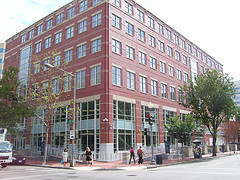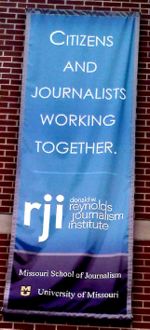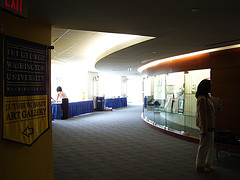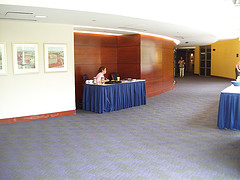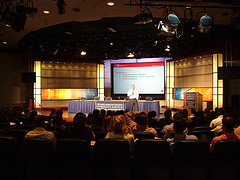Difference between revisions of "Gwu-program"
(→1:45 p.m. -- "GAME ON! Aggregators vs. Newspapers and the Future of Online News") |
|||
| Line 43: | Line 43: | ||
===1:45 p.m. -- "GAME ON! Aggregators vs. Newspapers and the Future of Online News"=== | ===1:45 p.m. -- "GAME ON! Aggregators vs. Newspapers and the Future of Online News"=== | ||
<ul> | <ul> | ||
| − | *Missouri School of Journalism grad student Emily Sussman previews her forthcoming multimedia project about past, present and future experiments with paywalls and portals. Topics: Steve Brill's | + | *Missouri School of Journalism grad student Emily Sussman previews her forthcoming multimedia project about past, present and future experiments with paywalls and portals. Topics: What is Steve Brill's "Journalism Online LLC"? . . . Do the financial distress of The News York Times and other newspaper companies necessarily doom them? . . . . Why did the '90s collaboration New Century Network fail? . . . are Google, Huffington Post and Newser really parasites? A Q&A follows.'''</ul> |
===2:15 p.m. -- QUICK-SHARE BRIEFINGS=== | ===2:15 p.m. -- QUICK-SHARE BRIEFINGS=== | ||
Revision as of 12:16, 28 April 2009
Contents
- 1 AN URGENT DISCUSSION:"From Gatekeeper to Information Valet:Work Plans for Sustaining Journalism"
- 1.1 Wed., May 27, 2009 / 10 a.m.-4 p.m. / The George Washington University / Jack Morton Auditorium / 805 21st Street NW / Washington D.C.
- 1.2 REGISTER NOW ($55/full day; $30 half day)
- 1.3 Tentative Program and Schedule
- 1.3.1 9 a.m. -- Pre-event coffee/danish and discussion
- 1.3.2 10 a.m. -- Inaugural Briefing: The Journalism Innovation Engine
- 1.3.3 10:30 a.m. -- The Strategic Landscape: A briefing
- 1.3.4 11 a.m. -- Work in progress: The Information in Valet Project
- 1.3.5 11:45 a.m. -- The Wall of ideas: Tapping the wisdom of our crowd
- 1.3.6 12:15-1 p.m. -- BOX LUNCH -- A chance to network ideas, and post breakouts
- 1.3.7 1 p.m. -- The Value of privacy: Findings from a new national study -- Prof. Lee Wilkins
- 1.3.8 1:45 p.m. -- "GAME ON! Aggregators vs. Newspapers and the Future of Online News"
- 1.3.9 2:15 p.m. -- QUICK-SHARE BRIEFINGS
- 1.3.10 BACK TO HOME PAGE
- 1.3.11 2:30 p.m. -- Discussion and snack break -- preparing for breakouts
- 1.3.12 2:45 p.m -- Self-identified convenors call their 2-5 breakouts
- 1.3.13 3:30 p.m. -- What we've learned / Next steps
- 1.3.14 REGISTER NOW ($55/full day; $30 half day)
AN URGENT DISCUSSION:
"From Gatekeeper to Information Valet:
Work Plans for Sustaining Journalism"
Wed., May 27, 2009 / 10 a.m.-4 p.m. / The George Washington University / Jack Morton Auditorium / 805 21st Street NW / Washington D.C.
REGISTER NOW ($55/full day; $30 half day)
Tentative Program and Schedule
(Times and presenters subject to change / check this page for last-minute updates)
9 a.m. -- Pre-event coffee/danish and discussion
- Connect early with other participants/attendees and presenters over coffee and danish from 9 a.m.
10 a.m. -- Inaugural Briefing: The Journalism Innovation Engine
- With the intention of broadly collaborating with other institutions and enterprises, the Donald W. Reynolds Journalism Institute at the Missouri School of Journalism is seeding a Journalism Innovation Engine at RJI. It's a one-year, "do-tank" to discover, assess, integrate and deploy multiple revenue solutions for the news industry across multiple platforms. Learn about the ideas and people behind the Engine in a short briefing and an interactive idea-gathering session. (Discussion leaders: Martin Langeveld / Jeff Vander Clute)
10:30 a.m. -- The Strategic Landscape: A briefing
- RJI commissioned former journalist and noted payments-industry analyst and consultant to comprehensively study the best research on mobile, print and web marketplaces to paint a picture from a non-news-industry perspective of strategies for sustaining journalism. Be prepared for some surprises in this thought-provoking discussion.
11 a.m. -- Work in progress: The Information in Valet Project
- Moving from mass markets to mass customization, from gatekeeper to "information valet" is an urgent task for traditional print and broadcast news organizations. Reynolds Fellow Bill Densmore, InfoCard's Paul Trevithick and other collaborators present a work-in-progress concept solution addressing user privacy, interest-based advertising, customized news and multi-site subscription networks -- including a proposed launch timetable. What's missing? A Q&A follows.
11:45 a.m. -- The Wall of ideas: Tapping the wisdom of our crowd
- The Jack Morton Auditorium and adjacent foyer offers the space during lunch for participants to caucus and agree on critical topics to propose for discussion during one round of concurrent, group-called breakout sessions in the afternoon. We'll describe how the convening process works before serving a box lunch. But first, we'll ask everyone in the room: What are you working on?
12:15-1 p.m. -- BOX LUNCH -- A chance to network ideas, and post breakouts
- Post discussion topics on the News Wall, and negotiate with fellow convenors to combine or morph related topics.
1 p.m. -- The Value of privacy: Findings from a new national study -- Prof. Lee Wilkins
- As the public becomes more aware of how its time and attention is "monetized," what are citizens willing to trade for the privacy, and how is it valued? Missouri School of Journalism Prof. Lee Wilkins reveals results from a new national study completed in in early April.
1:45 p.m. -- "GAME ON! Aggregators vs. Newspapers and the Future of Online News"
- Missouri School of Journalism grad student Emily Sussman previews her forthcoming multimedia project about past, present and future experiments with paywalls and portals. Topics: What is Steve Brill's "Journalism Online LLC"? . . . Do the financial distress of The News York Times and other newspaper companies necessarily doom them? . . . . Why did the '90s collaboration New Century Network fail? . . . are Google, Huffington Post and Newser really parasites? A Q&A follows.
2:15 p.m. -- QUICK-SHARE BRIEFINGS
Briefings are five-minute updates to share knowledge on key projects, ideas and technologies ongoing concurrently.
- Charles "Chuck" Lewis, American University, founder Center for Public Integrity -- "Update on formation and funding of non-profit national and regional investigative journalism initiatives."
- James "Jay" Hamilton, Duke University, author All the News That's Fit to Sell -- "Concepts for trading of privacy as an economic good."
- Jane Stevens, Reynolds Journalism Institute, "The RJI Collaboratory."
- Curtis Gans, "Saving the Newspaper at the Center of Civic Literacy."
BACK TO HOME PAGE
2:30 p.m. -- Discussion and snack break -- preparing for breakouts
- Five briefings in four hours: It's time to connect the dots, assess options and get ready for a flight of breakout sessions.
2:45 p.m -- Self-identified convenors call their 2-5 breakouts
- Breakouts disperse within Jack Morton, the atrium and other designated spaces. The goal: Formulate recommendations and ideas for action for the Innovation Engine, the InfoValet Project and the general journalism community. Return with three ideas and at least one proposed action step.
3:30 p.m. -- What we've learned / Next steps
- Our breakout session scribes return and present -- A fast, faciliated "what have we learned" and "next steps" session. (Bill Densmore)
- Joining the Journalism Trust initiative
REGISTER NOW ($55/full day; $30 half day)
Lodging reservations
For lodging, you may book a room at the special rate of $189/night, plus tax, at the university-owned George Washington University Inn, 824 New Hampshire Ave., NW, Washington, DC 20037. This "Reynolds Journalism Institute" rate is only available up request by telephoning the GWU Inn reservation desk directly at (202) 337-6620. The Inn offers complimentary Internet Access wire or wireless. Its lobby-located Notti Bianche restaurant is open for breakfast, lunch and dinner. (A box lunch on Wednesday, May 27, is included in the symposium schedule and registration fee).
For more information email Bill Densmore, 2008-2009 Reynolds Fellow, or call 573-882-9812.
"We need many news organizations to keep our country strong. We need to help each other. We need to partner, we need to experiment and we need to accept and agree that we will continue, we will not accept failure and we need to keep trying and trying different models until we get it right."
In a March 16 Time Magazine story about the Project on Excellence in Journalism's 2009 "State of the News Media," report, M.J. Stephey wrote: " . . . (I)f solutions aren't obvious, the report's overall message is: Will the future leaders of journalism please stand up?"
